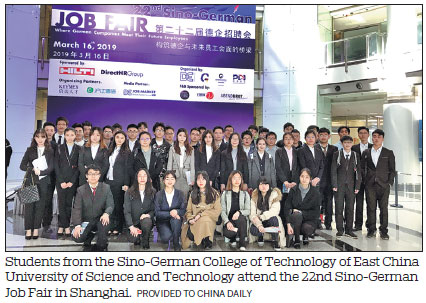College's 'E=MC4' teaching formula gives more chances to students
Over 60 enthusiastic students from the Sino-German College of Technology of East China University of Science and Technology attended the recently held 22nd Sino-German Job Fair in Shanghai.
The vast majority of the students, who presented their resumes to multiple employers, were in search of internship opportunities.
Unlike most of the second-year students in other colleges who are not familiar with job hunting, the students at the Sino-German College of Technology began to take part in various job fairs for internship when they were second grade. This is a reflection of the school's unique teaching mode.
After over 10 years of exploration with overseas institutions in joint education, the college has worked out a special pattern to cultivate talent with skills the human resource market wants.
E=MC4 for most people looks like a miswritten equation of mass-energy equivalence. But for the college, it stands for its secret recipe of talent cultivation - "Engineer equals Creative and Concentrated talent in the Cutting-edge research and technology area for advanced Manufacturing."
Based on such a concept, the college places a great value on students' practical ability and has built a complete engineering practice teaching syllabus. Participating in the German enterprise recruitment activities is one part of it - allowing the students to gain more hands-on experience in the field through an internship.
In addition to teaching in the classroom, students are required to participate in at least 20 weeks of work experience to gain what the university recognizes as being crucial to the development of its students - cognition training, social training, scientific training, basic engineering manufacturing skills training and specialty internships.
The university also spares no effort in bridging the divide between students and German companies by building communication platforms to let students gain insights into the real world. In fact, the university has selected a number of established institutions and signed agreements to form production, study and research bases, including well-known companies and research institutions.
So far, there are over 100 institutions willing to provide internship opportunities to students of the Sino-German College of Technology of ECUST.
"I'm very honored to be an intern at an emerging internet company. During my internship, I can always feel the innovative energy," said Jiao Longhao, a student who majored in information technology at the college. "They showed me the entire process that an automobile maker needs to go through from development to production so that I could find where my passion lays. I think that is what an internship is really about."
Li Xiang'an, an alumni and now a doctoral student in the United States, said: "In fact it is very rare for an institution like the Sino-German College of Technology of ECUST to arrange internship opportunities for every student. The experience during the internship helps not only in your career, but also in your life so you will not feel lost when you are fresh out of the university."
In the past decade, the joint education program has been awarded twice as an excellent model of education programs among Chinese and international institutions by the Shanghai Municipal Commission of Education in 2012 and 2017. The program the college offers with the Luebeck University of Applied Science has also been accredited twice by DAAD, known in English as the German Academic Exchange Service and obtained qualifications with ACQUIN, a German-based school accreditation system.
The university believes that the Belt and Road Initiative provides a rare opportunity and a strong impetus for strengthening international academic exchanges, and the ECUST is and will always be willing to use its advantage to work with institutions from Germany to achieve win-win results, build a diversified education mechanism and form a common education community under the remittance of the BRI.

(China Daily 04/27/2019 page20)














